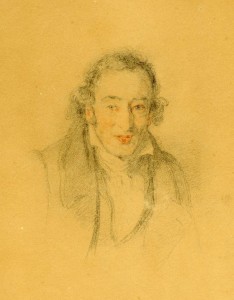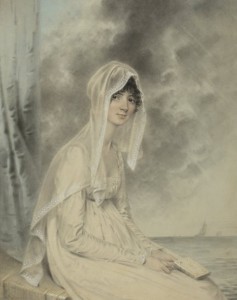One of Douce’s oldest friends was the writer Isaac D’Israeli (1766-1848), whose correspondence I am reading at the moment. Douce’s networks of antiquaries, artists, and fellow collectors hugely contributed to the formation and development of his collection. D’Israeli was responsible for some interesting additions to Douce’s circle: his introduction of the painter James Barry to Douce is a well-known example.
Between 1794 and 1796, D’Israeli spent some time in Exeter recovering from a nervous breakdown. During his convalescence, he wrote that he had joined a society of literary gentlemen:

Sir William Charles Ross, Portrait of Isaac D'Israeli, black and red chalk on brown paper (The British Museum, London)
There is […] a Literary Society who meet every 3 weeks, consisting of 12 gentlemen, who are going to publish, in imitation of the Manchester Society a volume of their transactions. I am going to be ennobled among these 12 apostles –Our Memoirs will not be of a scientific kind, nor of the valuable cast I fear of the Manchester –since I find that they admit Poetry in their volumes.
The Memoirs to which D’Israeli refers appeared under the title Essays by a Society of Gentlemen at Exeter in 1796. The aims of the Society are outlined in the Address read on 28 June 1792:
Being at least lovers of literature, having some taste for the arts, some acquaintance with the sciences, it was natural that we should meet together. It was natural to suppose that at such meeting we should experience a conversation different from that of more promiscuous assemblies; a conversation, in which wit might be joined with hilarity, learning with humour, information with decent gaiety; while properly trained, our minds would be subservient to that bond of politeness which consecrates the intercourse of scholars and gentlemen.
In the following paragraphs, the author explained that the ‘decent gaiety’ fostered by a good dinner and ‘the consequent enlivening glass’ somewhat hindered the coherent exchange of information that was the main aim of the Society. Therefore, its members decided that any discussion of their thoughts on topics ranging from Pindar to falconry, and from sepulchral stones to the contraction of the iris, should take place in writing. The nature and activities of the Society have been recently studied by Dafydd Moore in an article entitled ‘Patriotism, Politeness, and National Identity in the South West of England in the Late Eighteenth Century’ (ELH, vol. 76, no. 3, 2009, pp. 739-762).
During his stay in Exeter, D’Israeli provided some of his literary friends with letters of introduction to Douce. One of them was for Richard Hole, clergyman, antiquary and author of the poem Arthur, or the Northern Enchantments (1789). Another was for Thomas Gainsborough’s friend William Jackson (1730-1803), whose portrait (a mezzotint after James Walker) is included among Douce’s collection of ‘English literati’ (portfolio 135, no. 91).
Jackson’s son-in-law was the painter John Downman (1750-1824), who was also the cousin of another member of the Society, the physician and poet Hugh Downman (1740-1809). While looking through the works by Downman in the British Museum website, I came across this Portrait of Jane Douce:
This drawing was part of the exhibition The Intimate Portrait (BM 2008-09). The catalogue entry explains that the sitter was Jane Downman, the painter’s niece, who would become the wife of Douce’s nephew, William Henry, in 1807. But John Downman would have been acquainted with the Douce family much earlier, since a study for a portrait of ‘Old Mr Douce […] The Father of Thomas and William and Francis’, also in the British Museum, is dated 1788.
Douce corresponded with George Cumberland, based in Bristol, and with Thomas Kerrich in Cambridge, but his networks have always seemed to gravitate around London. D’Israeli’s’s introductions to the Society of Gentlemen at Exeter suggest that his activities and connections were more far-reaching. Their correspondence offers a different perspective on Douce’s association with what Moore has called ‘the discourses of Enlightenment Britain’.

